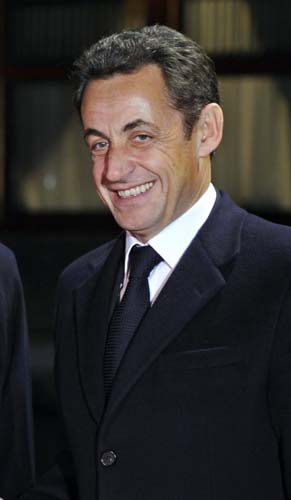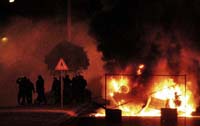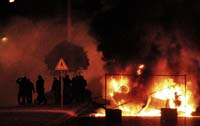 MCT
MCT
President of France
Beyond the gossip columns, tabloid drivel, peering paparazzi, unceasing rumors—who is French President Nicolas Sarkozy? Where will his ambitions take France?
Subscribe to the Real Truth for FREE news and analysis.
Subscribe NowMid-May 2007. Newly elected Nicolas Sarkozy delivers his inaugural speech to all of France. He vows to “unite the French”—to “rehabilitate the values of work, effort, merit and respect”—defeat intolerance—and “defend the independence of France” while working toward a “Europe that protects.”
Needless to say, Mr. Sarkozy has been labeled a reformist.
With his victory, Nicolas Sarkozy took charge of a France that had been shaped for 12 years by former President Jacques Chirac. Mr. Sarkozy’s election brought a feeling that change was in the air. He hinted at this in his victory speech, saying that France had “turned a new page of our history” (BBC).
Mr. Sarkozy is a dyed-in-the-wool Gaullist, holding to the ideals of the love of France, refusing to accept defeat, and belonging to the Union of Democrats for the Republic party, which he has supported throughout his political career.
The French president is undoubtedly hard-working, even to the point of being referred to as a “human dynamo, workaholic, forceful” and “overly ambitious.”
With just over a year as president under his belt, Mr. Sarkozy has acquired the rotating post of President of the European Union. It appears he will use every moment of the six-month term to further France and his political ideals.
Through years of diligent work, the hard-line, center-right politician rose from humble beginnings to become the charismatic leader and champion of reforming France, to return the nation to its desired global standing.
Rather than being reared in a family that would typically produce a French politician, Nicolas Sarkozy was born to Hungarian and Greek immigrants in 1955. Early in his life, President Sarkozy’s father abandoned his mother and children, leaving the family to fend for themselves.
The young Nicolas did not attend the elite school Ecole Nationale d’Administration, generally attended by those on their way to French politics. Instead, he trained to be a lawyer at the University of Paris X Naterre, and by age 22 was elected city councilor for the wealthy Paris suburb Neuilly-sur-Seine. By 28, he was elected the mayor of the same suburb—the youngest mayor of a town of over 50,000 residents—a post he held for 19 years.
Mr. Sarkozy wed twice before becoming president and was divorced from his second wife after entering office. He was married again while in his first term, under the intense scrutiny of the public and tabloid news media. He has three sons, two from his first marriage and one from his second.
Early in his political career, Mr. Sarkozy was befriended by then-Paris Mayor Jacques Chirac, who took the budding politician under his wing as his protégé.
However, the two had a dramatic falling out in 1995 when Mr. Sarkozy supported a rival during Mr. Chirac’s reelection campaign for president—a grudge that has still not been forgotten.
Even without Mr. Chirac’s help and guidance, Mr. Sarkozy continued to persevere, rising in popularity and political standing. And despite their differences, Mr. Chirac appointed him to the post of Interior Minister in 2004.
Given his background, it is no wonder that improving the national work ethic is one of Mr. Sarkozy’s top priorities. He is ready to put “France back to work.” During a televised debate during the presidential campaign, Mr. Sarkozy emphasized the importance of a strong work ethic. “France’s moral crisis has a name. It is a crisis of work,” he said. “I want the workers to be respected. I want to protect the French from seeing their jobs going abroad. I don’t believe in living on social welfare. I don’t believe everyone is the same. I believe in merit, I believe in effort and reward for that effort and I believe in social mobility. But above all, I believe in hard work.”
In a nation that prides itself in its 35-hour workweek and 27 national holidays, this has been received as a divisive stance, which critics view as another of Mr. Sarkozy’s characteristic traits.
While Interior Minister, Mr. Sarkozy weathered a series of violent riots in 2005, which broke out after a police chase allegedly led to the deaths of two young Muslim immigrants.
 MCT
MCTAs the violence raged for days, Mr. Sarkozy publicly called the rioting youths racaille—rabble, scum. Some thought these were undiplomatic words for an already tense situation. But the interior minister said this was the language of the streets, and maintained that the rioters should be dealt with using force.
Again in 2007, just months after taking office, similar riots erupted after two teenage residents of the Villiers-le-Bel project were killed when their motorcycle struck a police car. The unrest was particularly brutal, with rioters attacking, even firing upon, police officers.
As the violence subsided, President Sarkozy declared, “…we’ll find the shooters, and deploy whatever means that requires.” He continued, “That’s not something we can tolerate. It’s got a name: attempted murder” (BBC).
During his years in the public eye, Mr. Sarkozy used television to effectively sell himself and his ideas. He is widely recognized as an effective orator. Many attribute his ability to resonate well with the public to his training as a lawyer.
These characteristics, coupled with his seemingly unending drive, became useful when France was called upon for the rotating EU presidency. As his turn neared, it was well-known that Mr. Sarkozy intended to bring the European Union into a new era with the ratification of the Lisbon Treaty, which was penned to further unite the multi-national body.
However, with the June 2008 Irish “No” vote against the treaty, the EU was sent reeling. The presidency rotated to France at this precarious time, forcing a change for Mr. Sarkozy’s agenda. He declared that the Irish must vote again, and has since focused his efforts elsewhere.
Another issue of concern for Mr. Sarkozy is immigration, and in early July 2008, he proposed an ambitious immigration package. The pact, while still being negotiated, would allow EU member states to select immigrants according to need, fight to stop illegal immigration, and build up border patrols, as well as unify asylum laws throughout the European Union.
In a matter of days, President Sarkozy attended the Group of Eight summit in Japan, fielded questions of the European parliament for three hours—without notes and while suffering jet lag—and began work on a Europe Mediterranean alliance.
France hosted a meeting of 43 European and Mediterranean leaders to launch what is being called an EU-Med alliance. Both the Israeli and Palestinian leaders met under the same roof for the Paris summit. Though neither side shook hands or talked with one another, the event was seen as positive and Mr. Sarkozy described as historic. Voice of America reported that both Israel and Syria have called for Europe to have a bigger role in the Middle East peace process.
As his presidencies of both the EU and France continue, it remains to be seen what this ambitious politician can do for France, the European Union and the world.
 “Urban Guerillas” Riot in France
“Urban Guerillas” Riot in France